Dolphin
Senior Member (Voting Rights)
https://uwe-repository.worktribe.com/output/13780159
Shame, Psychology and ME
Cheston, Richard; Cheston, Katharine
Authors

Professor of Dementia Research Richard Cheston Richard.Cheston@uwe.ac.uk
Professor in Mental Health (Dementia Care)
Katharine Cheston
Abstract
In 2008, when she was 15, Katharine Cheston became ill with Myalgic Encephalomyelitis or ME. Over the next decade and more Katharine, and ourselves as a family, encountered many different psychological ideas and therapies, often being offered by non-psychologists. One such belief system involves the constuction of ME as a psychiatric illness that is perpetuated by false illness beliefs and the avoidance of exercise.
This session is a personal reflection on this process, the role that shame played in our lives and the wider dearth of appropriate services for people with ME.
Presentation Conference Type Presentation / Talk
Conference Name Psychological Sciences Research Group meeting
Start Date Feb 20, 2025
End Date Feb 20, 2025
Deposit Date Feb 20, 2025
Publicly Available Date Feb 25, 2025
Peer Reviewed Not Peer Reviewed
Keywords ME, Shame, Graded exercise therapy, CFS, CBT
Public URL https://uwe-repository.worktribe.com/output/13780159
This output contributes to the following UN Sustainable Development Goals:
Files
Shame, Psychology and ME (860 Kb)
Presentation
Download
Licence
http://www.rioxx.net/licenses/all-rights-reserved
CHSS School of Social Sciences
Centre for Health and Clinical Research
Health and wellbeing
Shame, Psychology and ME
Cheston, Richard; Cheston, Katharine
Authors
Professor of Dementia Research Richard Cheston Richard.Cheston@uwe.ac.uk
Professor in Mental Health (Dementia Care)
Katharine Cheston
Abstract
In 2008, when she was 15, Katharine Cheston became ill with Myalgic Encephalomyelitis or ME. Over the next decade and more Katharine, and ourselves as a family, encountered many different psychological ideas and therapies, often being offered by non-psychologists. One such belief system involves the constuction of ME as a psychiatric illness that is perpetuated by false illness beliefs and the avoidance of exercise.
This session is a personal reflection on this process, the role that shame played in our lives and the wider dearth of appropriate services for people with ME.
Presentation Conference Type Presentation / Talk
Conference Name Psychological Sciences Research Group meeting
Start Date Feb 20, 2025
End Date Feb 20, 2025
Deposit Date Feb 20, 2025
Publicly Available Date Feb 25, 2025
Peer Reviewed Not Peer Reviewed
Keywords ME, Shame, Graded exercise therapy, CFS, CBT
Public URL https://uwe-repository.worktribe.com/output/13780159
This output contributes to the following UN Sustainable Development Goals:
Files
Shame, Psychology and ME (860 Kb)
Presentation
Download
Licence
http://www.rioxx.net/licenses/all-rights-reserved
CHSS School of Social Sciences
Centre for Health and Clinical Research
Health and wellbeing
